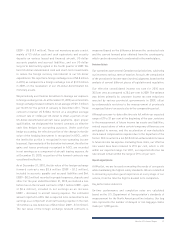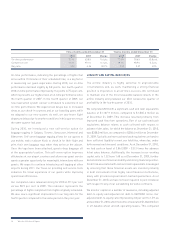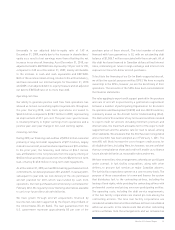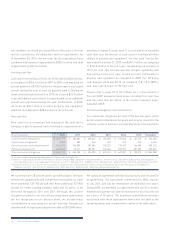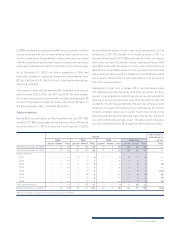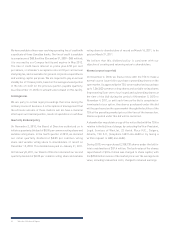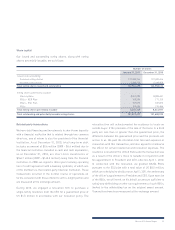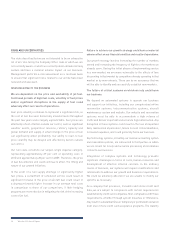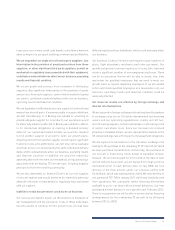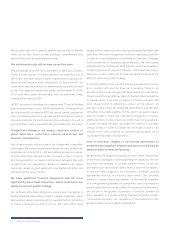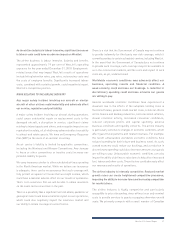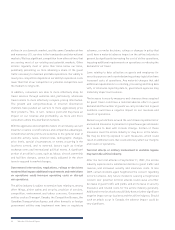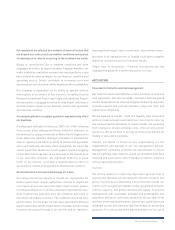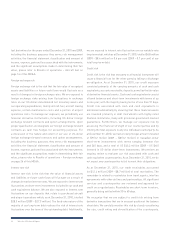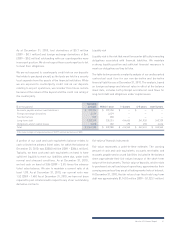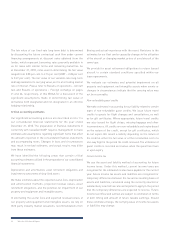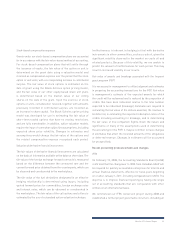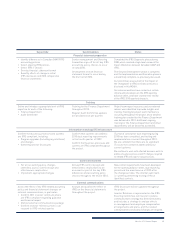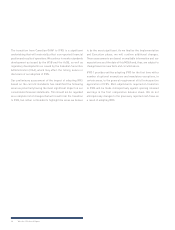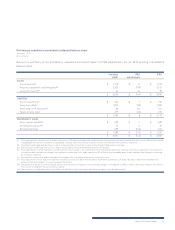Westjet 2010 Annual Report Download - page 39
Download and view the complete annual report
Please find page 39 of the 2010 Westjet annual report below. You can navigate through the pages in the report by either clicking on the pages listed below, or by using the keyword search tool below to find specific information within the annual report.
WestJet 2010 Annual Report 37
As the airline industry is labour intensive, significant increases
in labour costs could have an adverse impact on WestJet.
The airline business is labour intensive. Salaries and benefits
represented approximately 19 per cent of WestJet’s operating
expenses for the year ended December 31, 2010. Employment-
related issues that may impact WestJet’s results of operations
include hiring/retention rates, pay rates, outsourcing costs and
the costs of employee benefits. Significantly increased labour
costs, combined with curtailed growth, could negatively impact
WestJet’s competitive position.
RISKS RELATING TO THE AIRLINE INDUSTRY
Any major safety incident involving our aircraft or similar
aircraft of other airlines could materially and adversely affect
our service, reputation and profitability.
A major safety incident involving our aircraft during operations
could cause substantial repair or replacement costs to the
damaged aircraft, a disruption in service, significant claims
relating to injured guests and others, and a negative impact on our
reputation for safety, all of which may adversely affect our ability
to attract and retain guests. We have an Emergency Response
Plan (ERP) in the event of an incident occurring.
An air carrier’s liability is limited by applicable conventions,
including the Montreal and Warsaw Conventions. Any changes
to these or other conventions or treaties could increase our
potential liability to guests.
We carry insurance similar to other scheduled airlines operating
in the North American market. While we believe our insurance
is adequate, there can be no assurance that such coverage will
fully protect us against all losses that we might sustain, which
could have a material adverse effect on our results of operations.
There is no assurance that we will be able to obtain insurance
on the same terms as we have in the past.
There is a possibility that a significant terrorist attack, pandemic or
geological event could have a material impact on our operations,
which could also negatively impact the insurance market and
our ability to obtain coverage at current terms.
There is a risk that the Government of Canada may not continue
to provide indemnity for third party war risk coverage, which it
currently provides to certain scheduled carriers, including WestJet.
In the event that the Government of Canada does not continue
to provide such coverage, such coverage may not be available to
us in the commercial markets, and the costs and impact of such
costs are, as yet, undetermined.
Worldwide economic conditions may adversely affect our
business, operating results and financial condition. A
weak
economy could decrease our bookings. A reduction in
discretionary spending could decrease amounts our guests
are willing to pay.
General worldwide economic conditions have experienced a
downturn due to the effects of the subprime lending crisis in
the United States, general credit market crisis, collateral effects
on the finance and banking industries, concerns about inflation,
slower economic activity, decreased consumer confidence,
reduced corporate profits and capital spending, adverse
business conditions and liquidity concerns. The airline industry
is particularly sensitive to changes in economic conditions, which
affect guest travel patterns and related revenues. For example,
the recent unfavourable worldwide economic conditions have
reduced spending for both leisure and business travel. As such,
a weak economy could reduce our bookings, and a reduction in
discretionary spending could also decrease amounts our guests
are willing to pay. Unfavourable economic conditions can also
impact the ability of airlines to raise fares to help offset increased
fuel, labour and other costs. These factors could adversely affect
our revenues and results of operations.
The airline industry is intensely competitive. Reduced market
growth rates can create heightened competitive pressures,
impacting the ability to increase fares and increasing competition
for market share.
The airline industry is highly competitive and particularly
susceptible to price discounting, since airlines incur only nominal
costs to provide services to guests occupying otherwise unsold
seats. We primarily compete with a small number of Canadian


